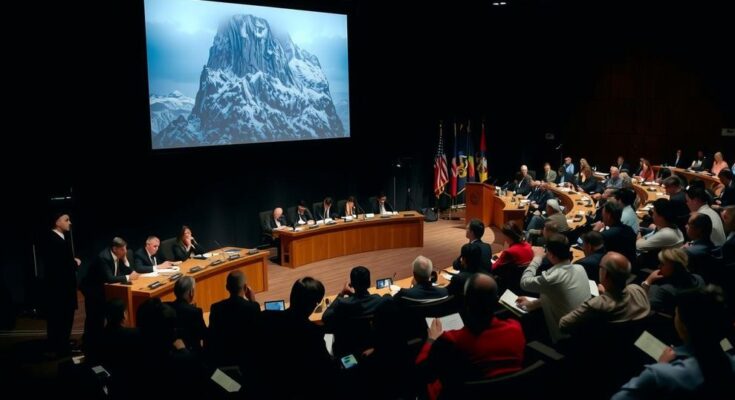The article highlights the disproportionate impact of climate change on developing nations, which contribute minimal emissions yet face severe consequences. As COP29 convenes, discussions focus on climate finance and the responsibility of wealthier nations to support those most affected by climate disasters. Key issues include the establishment of the Loss and Damage Fund and the need for increased financial commitments to support adaptation and mitigation efforts in the Global South.
The tragic irony of climate change is that the nations least responsible for its progression are those bearing the brunt of its effects. As the world prepares for the COP29 climate talks in Baku, Azerbaijan, it becomes increasingly apparent that developing countries, which have contributed minimally to global emissions, are suffering disproportionately from climate disasters. Since the Industrial Revolution, regions like Europe and North America have emitted approximately 60% of the world’s total greenhouse gases, thus accumulating wealth at the expense of the Global South. The pressing issues of climate finance and accountability dominate the agenda, specifically regarding the distribution of responsibility and resources to mitigate the impact on those nations most affected. Historically, industrialized nations have been the primary polluters, with emissions from Asia surging due to economic expansion, while Africa and South America remain low contributors, each accounting for just 3% of global emissions. This imbalance highlights the critical need for the principle of “common but differentiated responsibilities,” which acknowledges that while all nations must address climate change, not every country has contributed equally to its causation nor possesses the same capacity to respond. Developing countries endure escalating financial burdens as they strive to address climate-related damages and repair their infrastructures. The ongoing devastation reveals that economic growth linked to fossil fuel consumption perpetuates inequality: local gains are overshadowed by global environmental costs. The repercussions of climate change pose significant financial threats to developing nations. Governments are forced to allocate increasingly larger portions of their budgets to disaster recovery and maintenance, diverting funds from essential services that improve citizens’ welfare. Presently, agricultural devastation is palpable in southern Africa, where drought has led to catastrophic crop losses. As governments cope with the crisis, they find their hydroelectric sources compromised due to diminished water levels, prompting a shift toward fossil fuel dependency. To address these disparities, the international community recognized the necessity for compensating nations suffering loss and damage due to climate change. The Warsaw Mechanism for Loss and Damage, established in 2013, was a significant step that culminated in the creation of the Loss and Damage Fund during last year’s COP proceedings. Yet, this year’s meetings must confront difficult questions regarding fund allocations amidst diverse funding requirements from other climate initiatives. Wealthier nations have historically resisted acknowledging liability and avoided terms like “compensation,” thereby complicating the dialogue surrounding necessary financial commitments. This year’s COP29 is pivotal. It aims to redefine climate finance goals beyond the previous $100 billion annual target, in light of escalating damage that developing nations face. Stakeholders from the Global South advocate for a substantial increase, proposing over $724 billion annually to adequately address loss and damage considerations. The urgent need for grants, not loans, underscores the pressing nature of the situation, which is estimated to inflict $100 to $500 billion annually in damages on impoverished nations. However, the historical patterns of inaction raise doubts about whether tangible progress will emerge from this summit. Despite these uncertainties, COP29 has the potential to catalyze critical discussions on climate justice, particularly regarding obligations of wealthy nations to support those most afflicted by climate change. Continued advocacy within these forums remains essential to compel recognition of the systemic injustices intertwined with climate issues, and to secure the necessary financial support for vulnerable nations suffering the consequences of industrialized nations’ actions.
The article addresses the glaring inequality in climate change impacts, emphasizing that developing nations are disproportionately affected despite their minimal contributions to greenhouse gas emissions. Historical emissions data reveal that industrialized regions, particularly North America and Europe, are primarily responsible for global warming, while countries in Africa and South America represent only a small fraction of total emissions. The article introduces the principle of “common but differentiated responsibilities” and discusses ongoing international negotiations aimed at establishing a fair financial framework to support developing nations in their fight against climate impacts. The urgency of these discussions is underscored by recent devastating climate disasters affecting vulnerable populations globally.
In summary, the looming question at COP29 revolves around who should bear the financial burden for climate-related losses in developing nations. With historical responsibilities clearly delineated, and pressing financial calls from the Global South, the international community faces a critical juncture to rectify injustices perpetuated by climate change. The outcomes of this summit may determine whether adequate funds and recognition will be allocated to support those nations in dire need. Enhanced financial commitments must not only align with anticipated damages but also shift from loans to grants, ensuring that wealthier nations fulfill their obligations to mitigate the impacts of climate change on the most vulnerable. Only then can progress be achieved in addressing the inequities of climate responsibility and action.
Original Source: theconversation.com




